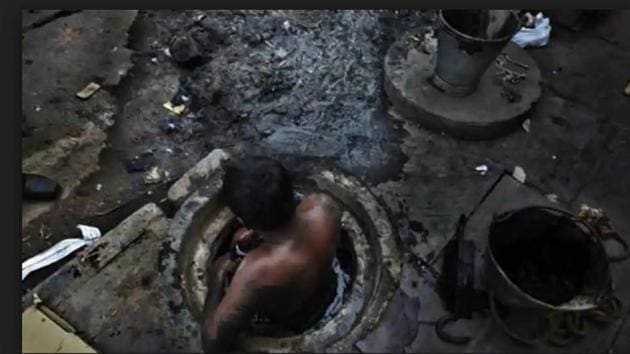We need to expand the reach of the manual scavenging law
According to the National Commission for Safai Karamacharis, one person dies every five days in the country while cleaning sewers or septic tanks
Last week, five people died after inhaling toxic gases in a well contaminated with industrial and domestic sewage in Kalyan. The tragedy took place because the well’s owner – who also died in the accident – hired a worker who was lowered into the well without any safety gear. The dead included the well owner’s son and two firemen sent in to help the other victims.

In January, four men died after they entered a sewage duct in Powai without any safety equipment. In September, five men were killed in Delhi’s Moti Nagar, while cleaning a sewage treatment plant in a residential complex. Investigations revealed they were not using any safety equipment either. In October, three workers died while cleaning a sewage drain in an industrial area in Dombivli, Thane.
According to the National Commission for Safai Karamacharis, one person dies every five days in the country while cleaning sewers or septic tanks. But this number could be a gross underestimate. Manhar Zala, chairman of the Commission said that in Delhi alone there were 16 such deaths in one period of six months. “If we had not pursued cases that we suspected were caused by unsafe working conditions in sewers, these deaths would not have been counted and would have been listed as general accidents,” said Zala.
The Prohibition of Employment as Manual Scavengers and their Rehabilitation Act 2013 prohibits manual cleaning of toilet waste, sewers, and septic tanks without protective gear and mechanised equipment. The law protects both municipal employees and casual workers hired by contractors. Workers who do these dangerous tasks have to be given gas masks, safety harness belts, and helmets. Municipal agencies have to provide equipment like pumps at dangerous sites like clogged sewers. “But contractors do not want to spend on the safety equipment,” said Zala.
Read more: Controversy over entry rules at new Navi Mumbai fire temple
Safety measures are non-existent, or at their best, basic. Usually, the worker’s only tool to detect toxic gases in sewers is a box of safety matches to test the presence of oxygen. It is common to see workers submerged in sewage up to their necks, cleaning nullahs in Mumbai.
The law can be used to prosecute government agencies that make people work in unsafe conditions. Dinesh Berdia of Sangharsh, a group working with conservancy workers, said that because now there is awareness of the law among bureaucrats, government agencies, to escape prosecution, are not employing such workers directly. “But they are transferring liability to contractors who do not follow the law. When accidents occur, the cases are manipulated so that there is no prosecution,” said Berdia.
To ensure that government agencies do not avoid prosecution by transferring such dangerous work to contractors, the law requires the ‘principal employer’ to be investigated, said Zala. But culprits escape the law, he added, citing the example of a case in Kanjurmarg where the family of a man who was killed while cleaning a sewer was sent off to their hometown with a small compensation so that the offenders did not face prosecution.
According to activists, another problem in prosecuting cases is the limited scope of the law which covers only work related to manual cleaning of human waste. This means that it can be argued that the deaths in Kalyan do not come under the law. Activists want the law to be expanded to include other similarly dangerous work. “The law covers only direct handling of human excreta; this needs to change. If they cannot expand the manual scavenging rules they should create a new law for such work,” said Berdia. “We have been trying to include such activities under the law. We have been talking to the government about the need to expand the scope of the law, but the government agencies are cautious.”
Zala also stressed the importance of expanding the law to make it more stringent. “The blame for such deaths is passed on to contractors and families of the victims are paid off to not pursue the cases,” he said. “The only way to stop these deaths is by completely mechanising such dangerous work.”
Stay updated with all the Breaking News and Latest News from Mumbai. Click here for comprehensive coverage of top Cities including Bengaluru, Delhi, Hyderabad, and more across India along with Stay informed on the latest happenings in World News.
Stay updated with all the Breaking News and Latest News from Mumbai. Click here for comprehensive coverage of top Cities including Bengaluru, Delhi, Hyderabad, and more across India along with Stay informed on the latest happenings in World News.






